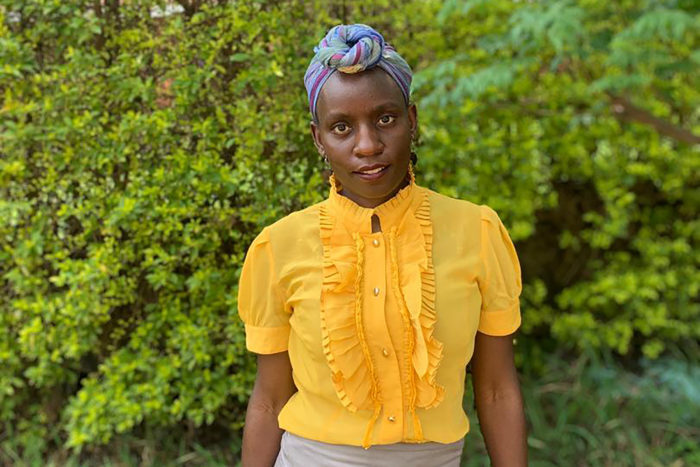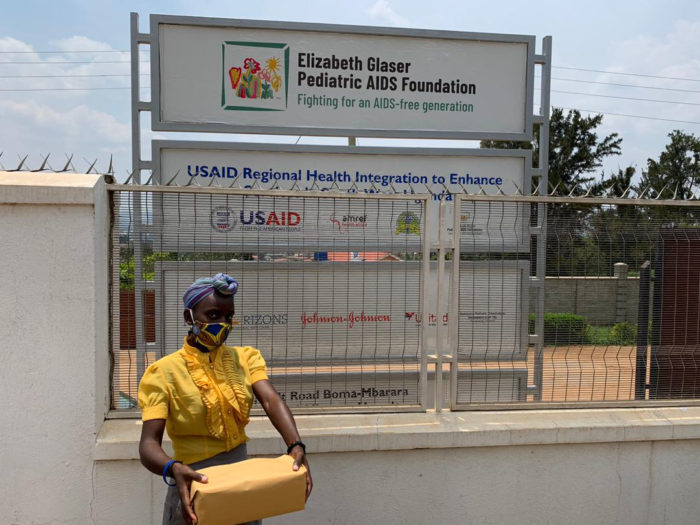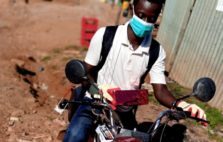 It’s 7:55 on a Friday evening. Sheila Alinda is composing a text message (SMS) to send to her more than 80 clients: “All the flowers of all the tomorrows are in the seeds of today. Dear flower, it is time for your seed.”
It’s 7:55 on a Friday evening. Sheila Alinda is composing a text message (SMS) to send to her more than 80 clients: “All the flowers of all the tomorrows are in the seeds of today. Dear flower, it is time for your seed.”
This message is a code to let young people living with HIV that their antiretroviral medication is on the way. Sheila and her team will now wrap up the medication, disguised as presents, and leave them in agreed-upon, confidential locations.
Sheila is the 21-year-old founder of Kyendi Kyendi, a program in southwest Uganda designed to help young people stay on their HIV treatment through individualized services. It is a way for people living with HIV to maintain privacy about their status and avoid stigma.
“I hated taking tablets, even though my family was supportive, and the school nurse was good to me.” Not surprisingly, Sheila was spotty about her adherence to treatment for a while, but that changed when she started attending Ariel Club, a psychosocial support group formed by the Elizabeth Glaser Pediatric AIDS Foundation (EGPAF), with support from USAID.
At the club, Sheila met Bena, another girl who was living with HIV, who told her that everything was going to be all right—and that if she took her medicine Sheila would live to be a grandmother.
“I believed Bena, and she and I have been friends since then,” says Sheila.
Through the Ariel Club, Sheila came to believe that everyone deserves the chance to receive individualized services, with a plan that will help them stay on course with treatment. She had her own difficulty leaving boarding school to get refills from her clinic. It was always hectic and would take a few days out of her term.
Sheila saw how extensive the stigma problem is for young people living with HIV—and how difficult it is for many of them to adhere to their medication regimen.
After high school, Sheila got a job as a peer navigator through the Infectious Disease Clinical Research Consortium (IDCRC), and she saw how extensive the stigma problem is for young people living with HIV—and how difficult it is for many of them to adhere to their medication regimen. Some of those who want to keep their status private travel to facilities far away where they are not known. But this is hard to sustain over the long run and too often lead to defaulting on treatment.
When Sheila was introduced by a mentor to the Social Innovation Academy, she saw an opportunity to create a client-centered service. The Social Innovation Academy is an incubator hub where young people are coached and supported to develop effective solutions to challenges in their community. This is where Sheila birthed Kyendi Kyendi Network.

Kyendi Kyendi means “I am who I am” in Luganda, the local language. The network offers a client-centered service that provides ARV delivery services as well as reminder and motivational messages for refills. Sheila makes sure ARVs are wrapped like presents and put in agreed-upon confidential locations.
The text refill messages are crafted so that if anyone accidentally reads them they would never know it was a reminder.
Sheila’s dream is bigger, however. While Kyendi Kyendi was founded as a delivery service, the need for psychosocial support is glaring. At drop-offs team members often find themselves providing emotional support and making additional referrals to healthcare or psychosocial services. The team also keeps track of scheduled visits, and if clients miss appointments, the team check-in both with the provider and the client to help resolve this problem. The Kyendi Kyendi team are well poised for this link to care, as they serve as peer counsellors who work at health centers and have a good understanding of HIV treatment and care.
Sheila is now working hard to expand Kyendi Kyendi services to include school and community outreach.
At a conference in Zambia, Sheila made a connection with another young innovator and together they are creating an app that will help map resources in the community, including where you can find peer support services, online resource information, social media support, service organizations, messaging, and updates.
Since the COVID-19 outbreak, the Kyendi Kyendi text message list is more active than ever. They are sharing guidance messages from the ministry of health and have increased the care messages to prevent members from feeling isolated and depressed, which could lead in poor adherence.
“One example is that of a single mother. She called me and [said], ‘I got your number from my doctor, and he said that you people give delivery of ARVs, but I don’t have money. I’ve just run out of a job due to the lockdown.’ I sat down with the team and we discussed how we could support her. The team said that if she just gave a contribution of whatever she can, it would be very fine. So we supported her, and she recommended us to friends of her who can access their medication.”
Sheila and her clients are beneficiaries of ARVs made possible by USAID and the generous support of the American people. As a child, Sheila chose to take her medication and survived through the Ariel clubs sponsored by the Elizabeth Glaser Pediatric AIDS Foundation.






